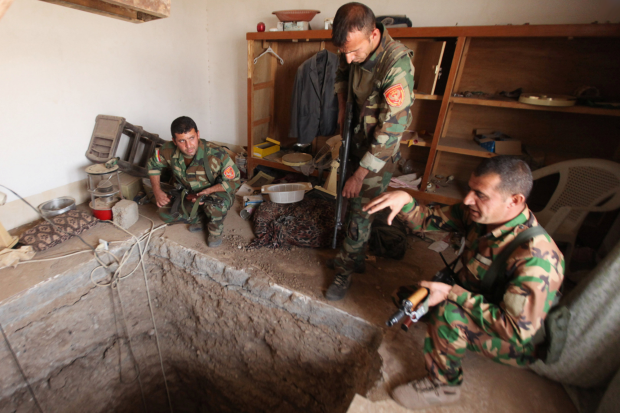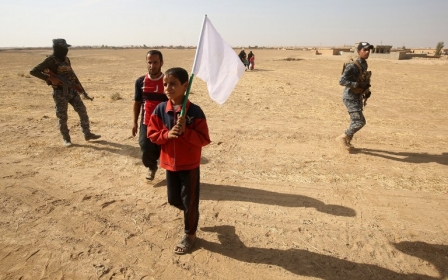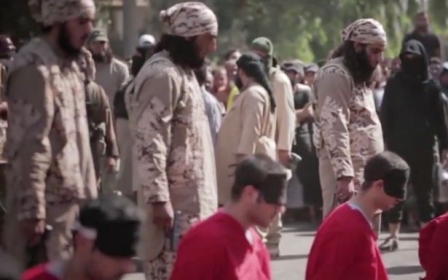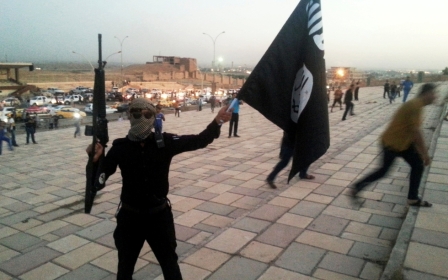Kurdish peshmerga forces open new front in battle for Mosul
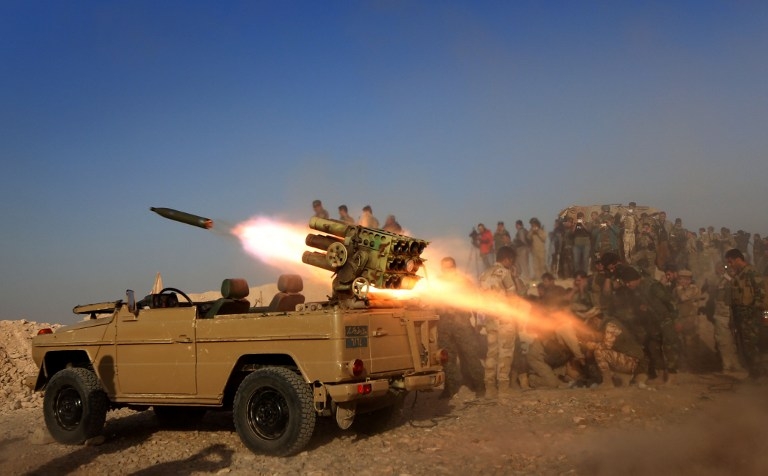
Kurdish forces launched a major assault on Thursday on a town held by the Islamic State (IS) group near Mosul, opening a new front in the offensive to wrest back the militants' last Iraqi bastion.
Prime Minister Haider al-Abadi told an international meeting in Paris that the offensive was "advancing faster than expected and planned" as it entered its fourth day.
In some areas, the Iraqi advance was met by a trickle of civilians fleeing both the fighting and the militants who ruled them for two years, but the feared mass exodus of as many of a million people from Mosul has yet to materialise.
The main target of the latest Kurdish push was the town of Bashiqa, to the northeast of Mosul. Iraqi government forces also pressed assaults towards the city from the east and south.
Who are the peshmerga?
The peshmerga are the armed forces of Iraq's autonomous Kurdish region. They nominally answer to the federal government but in practice operate independently. Forces from the Iranian Kurdistan Freedom Party (PAK) are embedded in some peshmerga operations.
Outside Bashiqa, Kurdish peshmerga forces, backed by US-led coalition air strikes, advanced in armoured vehicles and brought down two small drones that IS was using for reconnaissance.
The peshmerga command issued a statement saying its "large-scale operation" was launched at 6am local time near Bashiqa, adding: "The objectives are to clear a number of nearby villages and secure control of strategic areas to further restrict IS's movements."
IS drones
An AFP reporter in Nawaran, outside Bashiqa, saw one of the two drones neutralised by the peshmerga, a Raven RQ-11B model similar to a booby-trapped unmanned aircraft that killed two Kurdish fighters and wounded two French soldiers a week ago.
"These drones belong to IS ... So we shot this drone and brought it down. As you can see, the peshmerga destroyed it," said Aziz Weysi, a general in command of the peshmerga's elite Zaravani task force.
"These drones can do observation and can explode. They sent this one but it did not explode," he told the AFP news agency.
Iranian-Kurdish rebels of the Kurdistan Freedom Party (PAK) were involved in the operation alongside the peshmerga and apparently took a frontline role.
LIVE BLOG: The battle for Mosul
East of Mosul, where the peshmerga launched the offensive on Monday, Iraq's elite federal counter-terrorism service was taking control of Bartalla, a town whose mostly Christian residents fled the IS advance two years ago.
"We started breaching Bartalla early today. There are only 750 metres to cover to reach the centre," said Abdelwahab al-Saadi, a lieutenant general commanding operations in the area. "There is resistance, we already blew up three car bombs today," he said.
Bartalla, which lies less than 15km from the eastern edge of Mosul, saw fierce resistance from IS earlier this week.
Iraqi forces were also poised to attack nearby Qaraqosh, which was the largest Christian town in Iraq before IS swept across the Nineveh plain in August 2014, forcing everyone to flee.
Trickle of civilians
To the south, Iraqi forces were making steady gains, working their way up the Tigris Valley and meeting small numbers of fleeing civilians heading the other way.
Dozens of men, women and children who escaped from the village of Mdaraj, south of Mosul, some on foot and others with vehicles, were waiting as police searched their belongings.
"We sneaked out," said a man who gave his name as Abu Hussein.
READ: The liberation that awaits Mosul
He said that the huge plumes of black smoke from fires lit by IS to provide cover from air strikes had helped them slip out unnoticed.
"We raised white flags and went towards them," Abu Hussein said, describing how they approached Iraqi security forces.
The UN fears as many as a million people still trapped inside Mosul could be forced to flee by the fighting, a mass movement that would spark a humanitarian crisis. But Iraqi forces are still some distance from the city limits and no major outflows of civilians have been reported yet.
In a statement on Thursday, humanitarian organisations said that all forces involved in the conflict had a duty to protect civilians.
"With the start of the offensive, families face an impossible decision. If they stay inside Mosul, they risk being killed by heavy weapons and used as human shields by ISIS [IS], or being caught in cross-fire, shot by snipers or stepping on landmines if they try to flee," said the statement jointly signed by Oxfam, Save the Children, the International Rescue Committee and the Norwegian Refugee Council.
"The Government of Iraq must be supported to establish genuinely safe routes, prevent the use of explosive weapons in populated areas, and considerably scale up the humanitarian response. Plans must be developed and implemented now to secure reconciliation and durable solutions for those affected by conflict. Failure to achieve this today could lead to catastrophic consequences for Mosul’s children and their families, as well as Iraq’s future."
Post-IS Mosul
Abadi told the Paris meeting on Mosul's future that the operation to retake it was making progress. "We are advancing faster than we had expected and planned," the prime monister said by video link.
French President Francois Hollande told the meeting that militants were already leaving for Raqqa, their stronghold in neighbouring Syria.
"We can't afford mistakes in the pursuit of the terrorists who are already leaving Mosul for Raqqa," Hollande said. "We cannot allow those who were in Mosul to evaporate."
Iraq's second city was seized by IS in June 2014 as part of an offensive that saw the group conquer about a third of the country and declare a "caliphate" straddling Iraq and Syria.
IS's rule has seen some of the worst war crimes in recent history and the task of reconciling all the components of the area's complex religious and ethnic mosaic is a daunting one.
"Given the sheer size of Mosul - and its experience of savage rule at the hands of the Islamic State - revenge killing will likely be an issue in the days and months ahead," the Soufan consultancy said in a recent brief.
"A massive effort will be required to begin to heal what is a truly fractured city and society," it said.
This article is available in French on Middle East Eye French edition.
Middle East Eye propose une couverture et une analyse indépendantes et incomparables du Moyen-Orient, de l’Afrique du Nord et d’autres régions du monde. Pour en savoir plus sur la reprise de ce contenu et les frais qui s’appliquent, veuillez remplir ce formulaire [en anglais]. Pour en savoir plus sur MEE, cliquez ici [en anglais].


